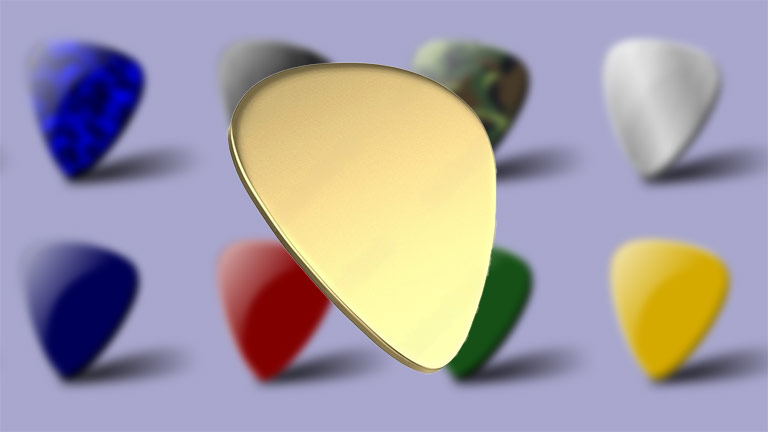Some people like playing with picks, others not so much. Many people would use a pick when the situation calls for it and otherwise use a plastic pick or even no pick.
While guitarists don’t debate as much about “pick vs. no pick,” unlike bassists, when it comes to metal picks, most guitarists are more vocal about their preferences. Many people say that metal picks produce a very aggressive tone and damage the guitar strings, while others who have played with metal picks for a long time like the sound and even use coins without the strings getting damaged much.
In this article, we will look at this matter in detail and try to find the answers.
Do Metal Guitar Picks Damage the Strings?
It is widely believed that metal picks do indeed damage the guitar strings more than plastic or nylon picks. If you play a classical guitar with nylon strings and don’t even think about using metal picks, you might break them in a few minutes or hours. As for steel strings, like in acoustic and electric guitars, the metal picks will wear them out sooner, but I don’t believe they’ll break exceptionally faster. Of course, it also depends on your technique and how you pick or pluck your strings.
But since strings are pretty cheap and many people like to change them often, I don’t think this should stop you from playing with metal picks. If you’re someone that likes the mellowed-out sound of older strings and would only change them after a long while, then maybe you wouldn’t like metal picks. And, for a variety of reasons, as they would make your tone very bright and sharp, too.
Do Metal Guitar Picks Damage the Guitar?
More than the strings, I’d be more concerned about the guitar if I were to use metal picks. Though most electric and acoustic guitars have a pickguard, the picks sometimes touch the other parts of the guitar’s body. While plastic picks wouldn’t damage much, metal picks can scrape the polishing or lacquer.
If you play a vintage or expensive guitar, you should be extra careful when using metal picks or refrain from using them altogether. If you have multiple guitars, try experimenting with a less expensive guitar first. You can try playing your favorite guitar with metal picks when you’re comfortable and have developed a better technique.
Why Do Many People Not Like Metal Picks?
From my experience, many people do not like using metal picks. In fact, most people who play with picks do not like them. But, the choice of others shouldn’t be a deterrent for you. What doesn’t work for them might work for you. But, for completeness, I am listing all the reasons many people avoid metal picks.
They Produce a Harsh Tone
The tone that metal picks produce is very bright and aggressive. Many people don’t like such a tone and feel it is too harsh. The tone may also have a bit of “scratchiness” to it unless played with an immaculate technique. Many people like to compare the sound of metal against metal as nails on a chalkboard, which doesn’t feel like the best of compliments.
The Attack is Too Sharp
Due to their sharp edge and lack of flexibility, metal picks give it a different and sharper metallic attack, which is not everyone’s cup of tea. Some people in specific genres may prefer the sharper attack, but most people don’t like it. Also, the type of metal the pick is made of will make a difference. For example, stainless steel picks will have a much sharper, even harsh attack than brass picks. This is why many metal picks users don’t like stainless steel and prefer brass or aluminum.
May Not Sound Good in Recording
Metal picks don’t have any flex, and guitarists use a slightly different technique to pluck with them. They are also usually smaller than other picks, enabling the guitarist to keep their finger closer to the strings while playing.
However, this technique has one drawback. While playing fast, the metal hitting the metal produces a sharp clicking sound, which could sometimes ruin the recording. So, unless the music style actually calls for it, like many acoustic songs leave the squeaking sound of the finger sliding across the string, most metal picks guitarists don’t use them for recording sessions.
Why Do Some Guitarists Use Metal Picks?
It is about preference. Some people like the feel of the stiffer metal picks because they don’t bend at all, unlike plastic ones. It also produces a significantly different tone, albeit more aggressive and with more treble. Some people like this powerful tone, while many don’t and think it sounds way too harsh. Metal pick or plectrum is one of the niche things some guitarists use to make their sound stand out or because it suits their playing style, and they get a much better feel when using it.
You might love metal picks if you like bright, aggressive tones with a metallic attack. Brian May and many others are known to use metal coins instead of picks to play guitar. If you really want to find out how your guitar should sound with a metal pick, you can try this yourself. The feel should be different due to the different shapes, but the tone should at least be similar.
Remember that though metal picks may be thin, they don’t bend and have a different feel. Many guitarists who play with picks (plastic, of course) have developed their techniques around picks that have some give (especially those who play with thinner picks). Such people may find the metal pick hard to work with initially because of a totally different feel. Some people who are more used to playing with different kinds of picks (thickness and shape) may find playing with metal picks much easier.
What Types of Metal Picks Are There?
Metal picks or plectrums, like other picks, come in different shapes, thicknesses and the material they are made of. The different types of metals or alloys used for metal picks are:
- stainless steel
- brass
- aluminum
- silver, gold etc.
All metal picks, irrespective of the specific metal they are made of, are stiff, but brass picks usually have a softer feel. It still won’t bend, though. Also, different metals would produce a distinct tone and have varying attacks. Soft metals such as aluminum and brass will produce a slightly less harsh tone, while stainless steel will have a harder, more metallic attack.
As for thickness, they could be as thin as 0.2mm and as thick as 1.5mm or even more. The very thin metal picks may have some flex and could be easier for someone new to metal plectrums to get started with. They would still produce very bright, clean tones.
Metal picks also come in different shapes. Some may be small, and others may have a sharp edge to pluck the strings with. Different people will like different shapes and thicknesses, and you cannot determine which one you’d like until you try it. If you’re interested, you can buy an assorted pack of different thicknesses and shapes and try it out yourself.
Some metal picks may come with a coating that may help with gripping, while others are just plain metal.
What Are the Advantages of Metal Picks?
There are various reasons why a guitarist may prefer to use metal picks. It may be because of the tone they can produce. Or it might be that the guitarist prefers the heavier and stiffer feel of these picks. Let’s look at all the advantages metal picks may have over plastic picks. If you favor many points mentioned here, you might like playing with metal picks despite their disadvantages.
Produces a Unique Bright Tone
Metal touching metal gives a different sound than any other pick can produce. The tone is clear, highly bright and aggressively metallic and could be great for genres such as death metal and hard-rock music. While plastic picks have a fuller sound, metal picks have a metallic twang and a harmonically rich sound. It could be great for playing lead and solos as the brighter tone, and more volume can cut through the mix more easily than plastic picks.
Have a Metallic Attack
Metal picks have a harder, more precise and metallic attack. If you love playing hard-hitting chords with a more prominent attack, this could work in your favor. Not everyone will love the noticeably different attacks metal picks provide, but you will love it if it suits your music and playing style.
Have a Different Feel
Some people love that the metal picks can be thin but very stiff at the same time. Others like thicker metal picks with some weight that don’t slip off as often. Also, since the picks don’t flex or have much or any give, it can allow for faster and more precise picking.
It would probably feel different than what you’re used to, but you’ll get comfortable with practice. You might need to be more accurate with your plucking by holding the pick parallel to the strings while plucking to get the best tone.
Lasts Longer
Stainless steel picks should last so long that you might either get bored or lose them. However, their edge may wear off sooner. Especially brass picks since it is a softer metal (alloy), while aluminum should wear the quickest.
As we have learned, different metal types will produce a slightly different tone, and your choice would depend on your choice of tone rather than longevity. So, even though metal picks may last longer owing to their intrinsic quality, it’s not reason enough to go for them just for this.
Closing Thoughts
Metal picks are niche plectrums that some people use for their uniquely bright tones. The same bright tone and aggressive attack could feel harsh to others, which is why some people avoid using them.
Music is much about experimentation. There would be no good music if everybody stuck to things that everybody else liked. While metal picks may damage the guitar strings and even the guitar itself unless the technique is excellent – a quick experiment wouldn’t be a bad idea.
Why not take a coin out and try playing with it? Or go to a music store and buy metal picks to see how they feel and sound. That is unless you play a nylon-stringed classical guitar!


